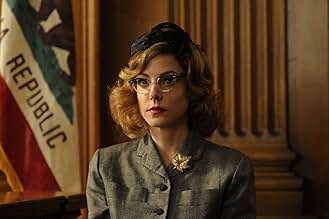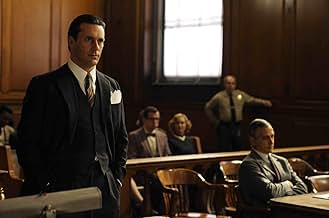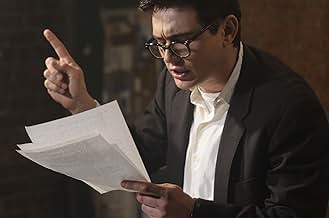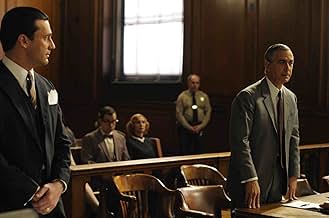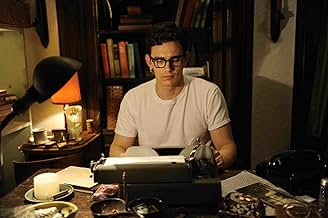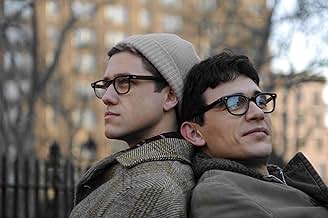VALUTAZIONE IMDb
6,6/10
13.582
LA TUA VALUTAZIONE
Nella San Francisco del 1957, un capolavoro di letteratura americana fu portato sul banco degli imputati.Nella San Francisco del 1957, un capolavoro di letteratura americana fu portato sul banco degli imputati.Nella San Francisco del 1957, un capolavoro di letteratura americana fu portato sul banco degli imputati.
- Regia
- Sceneggiatura
- Star
- Premi
- 2 vittorie e 8 candidature totali
Kaydence Frank
- Allen's Girlfriend
- (as Kadance Frank)
Allen Ginsberg
- Self
- (filmato d'archivio)
Recensioni in evidenza
Poetry can seriously damage your health. That's the main thing I've learned from recent biopics in which Johnny Depp's pox-ridden John Wilmot (The Libertine), Ben Whishaw's consumptive Keats (Bright Star) and Gwyneth Paltrow's depressive Sylvia Plath (Sylvia) have cornered the market in self-destructive behaviour.
I approached Howl, a movie about Beat Generation poet Allen Ginsberg, with a mixture of excitement and trepidation. On the one hand, it stars James Franco as Ginsberg and Mad Men's Jon Hamm as his lawyer, Jake Ehrlich. I'd watch these two ridiculously handsome actors in just about anything, but I really didn't want to sit through another Ode to Angst.
Directors Rob Epstein and Jeffrey Friedman -- The Times of Harvey Milk, The Celluloid Closet – are renowned for their documentary work and this film was originally conceived along those lines. Ginsberg's epic poem "Howl" was first published in 1955, but its explicit references to drugs and homosexuality (amongst other things) led to the prosecution of his publisher Lawrence Ferlinghetti in 1957. The intention was to commemorate the 50th anniversary of those events.
But instead of a straight documentary, the film-makers have opted to show us three sides of "Howl". There's the poem itself, with Franco trying to channel the spirit of Ginsberg as he addresses a rapt audience, in the b/w sequences from 1955. By contrast, the trial scenes are shot in colour and feature many voices with differing opinions about the merit of Ginsberg's work. Finally, the poet's own thoughts are recorded by an unseen interviewer. At the centre of all this, "Howl" is also given visual form, with a series of animations created by artist Eric Drooker.
For me, the courtroom scenes are the most enjoyable and thought-provoking element of the film. A succession of expert witnesses – some pompous, some just prejudiced – try to get to grips with issues of literary merit and the nature of obscenity. David Strathairn is admirably straight-faced in the role of prosecuting attorney Ralph McIntosh, as he tiptoes through a minefield of sexual imagery and baffling phrases like "angel-headed hipsters". Hamm's tight-lipped defence lawyer brings a sense of intellectual superiority to the proceedings – he's a crusading Don Draper with the added bonus of a moral compass.
Ginsberg himself wasn't on trial here and wasn't present at the proceedings, but the debate about whether the law is an effective tool for censoring and constraining artists remains highly topical. As one of the more thoughtful witnesses (played by Treat Williams) explains, "You can't translate poetry into prose. That's why it is poetry." The poet's own perspective on his life and work is captured in conversation with an off-camera reporter. A bearded, chain-smoking Ginsberg talks openly about his homosexuality, his mother's psychiatric problems, and fellow writer Carl Solomon, to whom "Howl" was dedicated. This strand of the film was inspired by a never-published interview that Ginsberg gave to Time magazine, but the film's dialogue is culled from a variety of sources.
Trying to explain the process of translating feelings into verse is a hard thing to pull off on film. Perhaps that's why most film-makers prefer to concentrate on the broken marriages and substance abuse that go hand in hand with tortured literary geniuses. Epstein and Friedman, who also wrote the screenplay, have done a good job trying to condense biographical detail and literary theory into what is basically a monologue – without being pretentious or boring. Brief flashbacks of Ginsberg pounding away at his typewriter, with his friend Neal Cassady, and in bed with long-term partner Peter Orlovsky, help to round out a portrait of the artist.
The final piece in the jigsaw – the poem – is the most problematic aspect of the film. How much of the work does the audience need to hear, and how do you hold their attention through some long and difficult passages? I quickly became bored of Franco's declamatory style, as he reads to a gathering of smug-looking hipsters at the Six Gallery in San Francisco.
When the recitation continues over Eric Drooker's animation, the effect is even worse. It's a matter of taste whether you thrill to the repeated imagery of fire, the minotaur-like Moloch and weirdly elongated bodies flying across the night sky. I prefer not to have someone else's interpretation of the verse foisted on me. Archive footage from the period would have been another option to fill the gap, but overall I think the poetry should have been used more sparingly.
Howl is bold, stylish attempt to capture a period in the mid-20th century when writing poetry could be an act of political rebellion – a shot across the bows of dull, conformist, heterosexual America. By casting the handsome and charismatic James Franco as Ginsberg, the directors could have turned this into yet another movie about the cult of personality. Instead they've largely succeeded in keeping the focus on the verse and on the act of writing. As the man said, "There's no Beat Generation. Just a bunch of guys trying to get published."
I approached Howl, a movie about Beat Generation poet Allen Ginsberg, with a mixture of excitement and trepidation. On the one hand, it stars James Franco as Ginsberg and Mad Men's Jon Hamm as his lawyer, Jake Ehrlich. I'd watch these two ridiculously handsome actors in just about anything, but I really didn't want to sit through another Ode to Angst.
Directors Rob Epstein and Jeffrey Friedman -- The Times of Harvey Milk, The Celluloid Closet – are renowned for their documentary work and this film was originally conceived along those lines. Ginsberg's epic poem "Howl" was first published in 1955, but its explicit references to drugs and homosexuality (amongst other things) led to the prosecution of his publisher Lawrence Ferlinghetti in 1957. The intention was to commemorate the 50th anniversary of those events.
But instead of a straight documentary, the film-makers have opted to show us three sides of "Howl". There's the poem itself, with Franco trying to channel the spirit of Ginsberg as he addresses a rapt audience, in the b/w sequences from 1955. By contrast, the trial scenes are shot in colour and feature many voices with differing opinions about the merit of Ginsberg's work. Finally, the poet's own thoughts are recorded by an unseen interviewer. At the centre of all this, "Howl" is also given visual form, with a series of animations created by artist Eric Drooker.
For me, the courtroom scenes are the most enjoyable and thought-provoking element of the film. A succession of expert witnesses – some pompous, some just prejudiced – try to get to grips with issues of literary merit and the nature of obscenity. David Strathairn is admirably straight-faced in the role of prosecuting attorney Ralph McIntosh, as he tiptoes through a minefield of sexual imagery and baffling phrases like "angel-headed hipsters". Hamm's tight-lipped defence lawyer brings a sense of intellectual superiority to the proceedings – he's a crusading Don Draper with the added bonus of a moral compass.
Ginsberg himself wasn't on trial here and wasn't present at the proceedings, but the debate about whether the law is an effective tool for censoring and constraining artists remains highly topical. As one of the more thoughtful witnesses (played by Treat Williams) explains, "You can't translate poetry into prose. That's why it is poetry." The poet's own perspective on his life and work is captured in conversation with an off-camera reporter. A bearded, chain-smoking Ginsberg talks openly about his homosexuality, his mother's psychiatric problems, and fellow writer Carl Solomon, to whom "Howl" was dedicated. This strand of the film was inspired by a never-published interview that Ginsberg gave to Time magazine, but the film's dialogue is culled from a variety of sources.
Trying to explain the process of translating feelings into verse is a hard thing to pull off on film. Perhaps that's why most film-makers prefer to concentrate on the broken marriages and substance abuse that go hand in hand with tortured literary geniuses. Epstein and Friedman, who also wrote the screenplay, have done a good job trying to condense biographical detail and literary theory into what is basically a monologue – without being pretentious or boring. Brief flashbacks of Ginsberg pounding away at his typewriter, with his friend Neal Cassady, and in bed with long-term partner Peter Orlovsky, help to round out a portrait of the artist.
The final piece in the jigsaw – the poem – is the most problematic aspect of the film. How much of the work does the audience need to hear, and how do you hold their attention through some long and difficult passages? I quickly became bored of Franco's declamatory style, as he reads to a gathering of smug-looking hipsters at the Six Gallery in San Francisco.
When the recitation continues over Eric Drooker's animation, the effect is even worse. It's a matter of taste whether you thrill to the repeated imagery of fire, the minotaur-like Moloch and weirdly elongated bodies flying across the night sky. I prefer not to have someone else's interpretation of the verse foisted on me. Archive footage from the period would have been another option to fill the gap, but overall I think the poetry should have been used more sparingly.
Howl is bold, stylish attempt to capture a period in the mid-20th century when writing poetry could be an act of political rebellion – a shot across the bows of dull, conformist, heterosexual America. By casting the handsome and charismatic James Franco as Ginsberg, the directors could have turned this into yet another movie about the cult of personality. Instead they've largely succeeded in keeping the focus on the verse and on the act of writing. As the man said, "There's no Beat Generation. Just a bunch of guys trying to get published."
Howl might be a one-of-a-kind film experience if not for Chicago 10, another film that blended documentary, dramatization and animation together into a blender of personal history. But what sets this film apart from that and all others is that poetry becomes interwoven into a courtroom trial procedural - all, apparently, taken from the actual court transcripts of what the prosecution/defense asked of the people on the stand - so that it becomes about free speech. At the same time it's a quasi-biopic on Allen Ginsberg, who was a real free spirit, but also a shy Jewish kid from New York city who lost his mother as a child and worried about writing poems that might irk the ire of his father (he even considered not publishing Howl for that reason).
It's a beautifully surreal little treat of a film that treats its subject seriously while also giving life to the epic poem that stays timeless, as with Walt Whitman's Leaves of Grass (which also gets name- dropped here). The filmmakers bring together the poetic readings - done by James Franco, one of his real 'embodiment' performances like Saul in Pineapple Express that is basically stunning - from in front of a live audience (where one sees how Ginsberg at first has an audience patient and waiting and then is full of life and looking forward to every next thing he says) and in animation. The poem becomes alive through the low-budget drawings, and depending on the stanza it can be at least acceptable and at most mind-blowing. You almost want the poem to go longer to sink in deeper to those Ginsberg stanzas that flow out with what appears to be stream of consciousness, but really has a structure to it.
Acting is fantastic - David Straithairn, Jon Hamm and in a one-scene keeper Jeff Daniels - Franco keeps things moving so well with his performance, and the poem is given it's best context in personal and social history. All of a sudden, thanks to a film like this, the material becomes alive again, like a student picking it up and sinking into it for the first time.
It's a beautifully surreal little treat of a film that treats its subject seriously while also giving life to the epic poem that stays timeless, as with Walt Whitman's Leaves of Grass (which also gets name- dropped here). The filmmakers bring together the poetic readings - done by James Franco, one of his real 'embodiment' performances like Saul in Pineapple Express that is basically stunning - from in front of a live audience (where one sees how Ginsberg at first has an audience patient and waiting and then is full of life and looking forward to every next thing he says) and in animation. The poem becomes alive through the low-budget drawings, and depending on the stanza it can be at least acceptable and at most mind-blowing. You almost want the poem to go longer to sink in deeper to those Ginsberg stanzas that flow out with what appears to be stream of consciousness, but really has a structure to it.
Acting is fantastic - David Straithairn, Jon Hamm and in a one-scene keeper Jeff Daniels - Franco keeps things moving so well with his performance, and the poem is given it's best context in personal and social history. All of a sudden, thanks to a film like this, the material becomes alive again, like a student picking it up and sinking into it for the first time.
I'm surprised that this film worked as well as it did, and that it has been received as well as it has here. I read Howl about 5 years after Ginsberg wrote it, when I was in high school, and, like it or not, it became part of my thinking in the fifty years since then. Still in high school, I could quote passages from the poem at my friends, who would follow up with the next passage, etc. Boooring. But if you had told me that a film would be made about it, with a script constructed of trial transcripts and interviews in the public record, alternating with a recreation of Ginsberg's first public (paying-public; there was ONE previous reading of the full poem) reading of the poem, I wouldn't have expected much. And I would have been wrong. It's well-done and well-acted, and no excuses are made for anything about Ginsberg or his work. I was dismayed at first to see the poem interpreted into animation, but the filmmakers were savvy enough to produce the animation in the style of the times, i.e., 1955, when Disney's Fantasia was still the state of the art, and the animation in Howl could have come out of the Night on Bald Mountain section. In the end, it worked, I think, by keeping the viewer visually in the world of the poem itself, rather than in the biographical material about Ginsberg or the trial and the litigants. So if you want to watch a movie about a poem, and the poet and his friends, but mainly about the poem, this one does a pretty good job.
This is a brilliant film. I have not seen a another film that successfully shows how someone creates a work of art, especially a literary work. This film does it brilliantly, largely by quotations from the poem read very effectively by James Franco, who plays Ginsberg. Acted out interviews illuminate many things and the trial itself is extremely involving to watch. Even the animated portions we see while we hear parts of the poem work well. It's a remarkable film about artistic creation and how the artist must be allowed to use his own words and to use language that expresses his meaning fully, not language that is inoffensive to some imaginary reader.
Franco, John Hamm, David Strathairn, Bob Balaban, Jeff Daniels are all at their best, and seem truly committed to the project.
You don't even have to be a fan of Ginsberg, or know much about who he was to enjoy this. I was really impressed, one of the best films of this year, but it will likely be ignored by many.
Franco, John Hamm, David Strathairn, Bob Balaban, Jeff Daniels are all at their best, and seem truly committed to the project.
You don't even have to be a fan of Ginsberg, or know much about who he was to enjoy this. I was really impressed, one of the best films of this year, but it will likely be ignored by many.
"I saw the best minds of my generation destroyed by madness, starving hysterical naked, dragging themselves through the Negro streets at dawn looking for an angry fix, angel headed hipsters burning for the ancient heavenly connection to the starry dynamo in the machinery of night
"
So begins the poem "Howl" by Allen Ginsberg who was one of the most respected writers and acclaimed American poets of the so-called Beat Generation of the late 1950s, poets that included Jack Kerouac, William Burroughs, Lawrence Ferlinghetti, Gregory Corso and others. The poem about sex, drugs, politics, and race shocked many people when first published with its explicit language and sexual images and became a cause célèbre leading to an obscenity trial in San Francisco that tested the limits of the First Amendment. According to Ginsberg, reflecting the culture of the fifties, "If you could write about homosexuality, you could write about anything."
Directed by Rob Epstein and Jeffrey Friedman, the film Howl is a celebration not only of the poem but of the artist who, amidst the turbulence that surrounded its initial publication, sought to define his own identity. It is a non-linear work that interweaves a reading of the poem by actor James Franco as Ginsberg with animation by the graphic artist Eric Drooker, a dramatization of the obscenity trial, and an interview with Ginsberg culled from the poet's own words. The film begins with the young Ginsberg reciting "Howl" in a coffeehouse to a young and approving audience. As the poem is being read aloud, the spoken words are animated on screen. Though expertly conceived, the animation creates a literal interpretation of the poem that fails to convey its power and beauty.
According to the poet, he never planned to publish "Howl" because he thought some of the language might offend his father and thus felt free to write anything that came to mind, knowing that no one would ever read it. Consequently, "Howl" delivers a wild torrent of words filled with lines about radical politics, drugs, and homosexuality conveying images that are often erotic and sometimes scatological. The poem may not always be understandable but, especially as read aloud, is filled with a rhythmic pulse that is pure music. The poem describes people who are in love, in pain, and in joy, people who "howled on their knees in the subway and were dragged off the roof waving genitals and manuscripts, who let themselves be f**ked in the a*s by saintly motorcyclists, and screamed with joy, who blew and were blown by those human seraphim, the sailors, caresses of Atlantic and Caribbean love, who balled in the morning in the evenings in rose gardens and the grass of public parks and cemeteries scattering their semen freely to whomever come who may."
The interviews reveal Ginsberg's mental state and how he ended up in a mental hospital, his only way out being to lie to the doctors that he would pursue heterosexuality. His friend in the institute, Carl Solomon to whom the poem is dedicated, however, had no easy way out, having to endure electro-shock therapy and a strait-jacket. Ginsberg's mother, Naomi, was also in a mental hospital for an unknown illness before she died. These troubling personal events in Ginsberg's life are integrated into the film in a way that is very moving although, because most of the poem consists of readings and conversations, the film itself is not very cinematic. One of the strong components is Ginsberg's homosexuality and the film depicts his relationships with Neal Cassidy and Peter Orlovsky with whom he loved and lived with for most of his adult life.
Using actual court transcripts, Howl also dramatizes the courtroom drama with attorneys played by Jon Hamm and David Straithairn arguing the case before the judge (Bob Balaban). Ginsberg himself was not at the trial since it was brought against the City Lights Publishers and Lawrence Ferlinghetti. The witnesses consisted of academics and literary figures either condemning the poem as worthless and without merit or praising it as an innovative and important work of art. The judge in the case eventually determined that the poem had "redeeming social importance," a landmark decision.
Franco's performance captures the energy of Ginsberg's poetry and his feelings about his life and art in the interview but overall fails to convey his warmth and humanity, his spirituality, his playfulness, or his progressive political views. In short, it succeeds in capturing most everything about the artist except the very qualities that make him so inspiring. As the film ends, we see updated information about those mentioned in the film while, in the background, we hear Ginsberg singing "Father Death Blues," a moving ode to the death of his father in a version by the aging poet as he nears the end of his life.
"Father Breath, once more farewell. Birth you gave was no thing ill. My heart is still, as time will tell. Genius Death your art is done. Lover Death your body's gone. Father Death I'm coming home."
Though Allen Ginsberg now home, his art will never be done.
So begins the poem "Howl" by Allen Ginsberg who was one of the most respected writers and acclaimed American poets of the so-called Beat Generation of the late 1950s, poets that included Jack Kerouac, William Burroughs, Lawrence Ferlinghetti, Gregory Corso and others. The poem about sex, drugs, politics, and race shocked many people when first published with its explicit language and sexual images and became a cause célèbre leading to an obscenity trial in San Francisco that tested the limits of the First Amendment. According to Ginsberg, reflecting the culture of the fifties, "If you could write about homosexuality, you could write about anything."
Directed by Rob Epstein and Jeffrey Friedman, the film Howl is a celebration not only of the poem but of the artist who, amidst the turbulence that surrounded its initial publication, sought to define his own identity. It is a non-linear work that interweaves a reading of the poem by actor James Franco as Ginsberg with animation by the graphic artist Eric Drooker, a dramatization of the obscenity trial, and an interview with Ginsberg culled from the poet's own words. The film begins with the young Ginsberg reciting "Howl" in a coffeehouse to a young and approving audience. As the poem is being read aloud, the spoken words are animated on screen. Though expertly conceived, the animation creates a literal interpretation of the poem that fails to convey its power and beauty.
According to the poet, he never planned to publish "Howl" because he thought some of the language might offend his father and thus felt free to write anything that came to mind, knowing that no one would ever read it. Consequently, "Howl" delivers a wild torrent of words filled with lines about radical politics, drugs, and homosexuality conveying images that are often erotic and sometimes scatological. The poem may not always be understandable but, especially as read aloud, is filled with a rhythmic pulse that is pure music. The poem describes people who are in love, in pain, and in joy, people who "howled on their knees in the subway and were dragged off the roof waving genitals and manuscripts, who let themselves be f**ked in the a*s by saintly motorcyclists, and screamed with joy, who blew and were blown by those human seraphim, the sailors, caresses of Atlantic and Caribbean love, who balled in the morning in the evenings in rose gardens and the grass of public parks and cemeteries scattering their semen freely to whomever come who may."
The interviews reveal Ginsberg's mental state and how he ended up in a mental hospital, his only way out being to lie to the doctors that he would pursue heterosexuality. His friend in the institute, Carl Solomon to whom the poem is dedicated, however, had no easy way out, having to endure electro-shock therapy and a strait-jacket. Ginsberg's mother, Naomi, was also in a mental hospital for an unknown illness before she died. These troubling personal events in Ginsberg's life are integrated into the film in a way that is very moving although, because most of the poem consists of readings and conversations, the film itself is not very cinematic. One of the strong components is Ginsberg's homosexuality and the film depicts his relationships with Neal Cassidy and Peter Orlovsky with whom he loved and lived with for most of his adult life.
Using actual court transcripts, Howl also dramatizes the courtroom drama with attorneys played by Jon Hamm and David Straithairn arguing the case before the judge (Bob Balaban). Ginsberg himself was not at the trial since it was brought against the City Lights Publishers and Lawrence Ferlinghetti. The witnesses consisted of academics and literary figures either condemning the poem as worthless and without merit or praising it as an innovative and important work of art. The judge in the case eventually determined that the poem had "redeeming social importance," a landmark decision.
Franco's performance captures the energy of Ginsberg's poetry and his feelings about his life and art in the interview but overall fails to convey his warmth and humanity, his spirituality, his playfulness, or his progressive political views. In short, it succeeds in capturing most everything about the artist except the very qualities that make him so inspiring. As the film ends, we see updated information about those mentioned in the film while, in the background, we hear Ginsberg singing "Father Death Blues," a moving ode to the death of his father in a version by the aging poet as he nears the end of his life.
"Father Breath, once more farewell. Birth you gave was no thing ill. My heart is still, as time will tell. Genius Death your art is done. Lover Death your body's gone. Father Death I'm coming home."
Though Allen Ginsberg now home, his art will never be done.
Lo sapevi?
- QuizShot in 14 days around New York City in March/April 2009.
- BlooperAbout 29 minutes in, Franco (as Ginsberg) lights up a cigarette. You can clearly see a layer of digital shading (meant to darken Franco's beard) that is overlaid onto his face, esp. his left jaw. This shading also goes over Franco's hand in this scene.
- Citazioni
Allen Ginsberg: There's no beat generation. It's just a bunch of guys trying to get published.
- Colonne sonoreTonight at the Sands
Written by Jack Arel and Jean-Claude Petit (as Jean-Caude Petit)
ZFC Music (ASCAP)
Courtesy of FirstCom Music
I più visti
Accedi per valutare e creare un elenco di titoli salvati per ottenere consigli personalizzati
- How long is Howl?Powered by Alexa
Dettagli
Botteghino
- Lordo Stati Uniti e Canada
- 617.334 USD
- Fine settimana di apertura Stati Uniti e Canada
- 51.185 USD
- 26 set 2010
- Lordo in tutto il mondo
- 1.614.810 USD
- Tempo di esecuzione1 ora 24 minuti
- Colore
- Mix di suoni
- Proporzioni
- 1.85 : 1
Contribuisci a questa pagina
Suggerisci una modifica o aggiungi i contenuti mancanti








